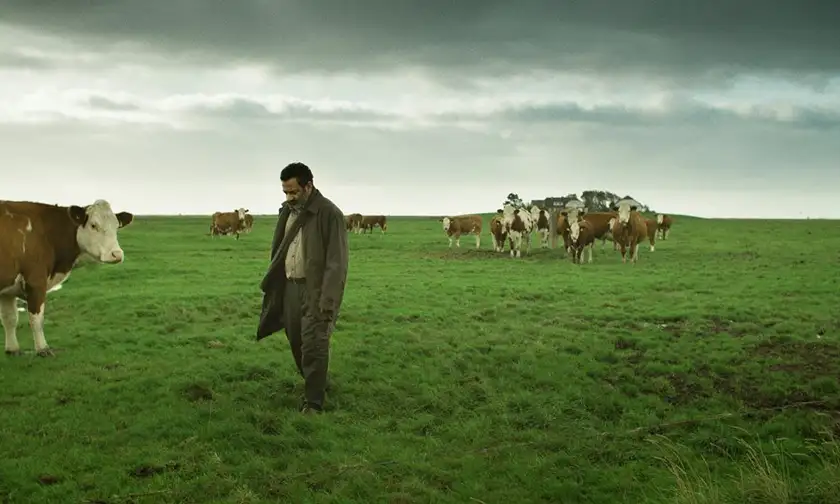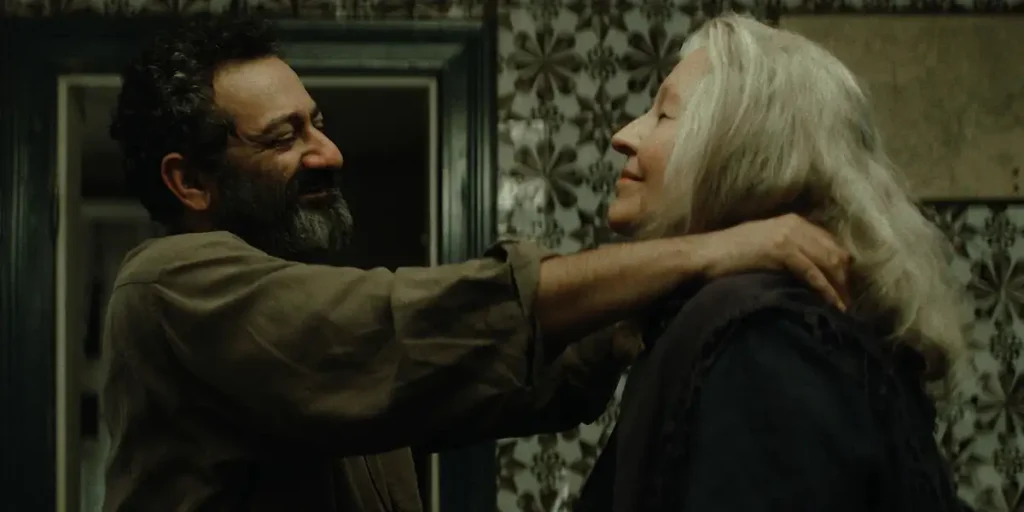Yunan is a thoroughly sentimental drama that authentically explores mental health in modern society, despite some unnecessary experiments.
Director: Ameer Fakher Eldin
Genre: Drama
Run Time: 124′
Berlin Film Festival Screening: February 19, 2025
Release Date: TBA
Mental health is a broad and complex concept, and as society has come to better understand in recent decades, it can encompass a vast range of experiences. Mental struggles can manifest differently in every single person, and that’s something that Yunan understands better than most dramas on the subject.
Ameer Fakher Eldin’s touching film is a slow and methodical odyssey through the flooded marshes of rural Germany, asking important questions about how we should interact with those going through life’s darkest moments, and what responsibilities we bear to help them.
Yunan opens with a cryptic line of poetry from the Abbasid writer Al-Mutanabbi, discussing the fact that space can still linger between two people who crave each other’s presence. It’s a bittersweet concept, and it’s one that appears in full force from the moment Yunan begins. The story opens with its protagonist Munir (Georges Khabbaz), an isolated man balancing his own worsening health with his responsibility to look after his sick mother. When a doctor advises him to take a break from his stressful life, he travels to a remote island and takes up residence with an enigmatic hotel owner named Valeska (Hanna Schygulla), who quickly notices the man’s internal pain and attempts to bridge the gap between his soul and the world around him.
Fundamentally, Yunan is a film about needing help but not knowing how to ask for it. Munir is such a compelling protagonist, but his story is one that’s certainly not easy to watch. Eldin and Khabbaz do an incredible job of making this character feel authentic and multi-dimensional, whether that’s through the gentle subtexts that appear throughout the former’s visual language, or the empathetic performance delivered by the latter. This story only works if it’s told exclusively from Munir’s perspective, and the crew do an impeccable job of allowing the audience into his mind.

This thematic idea runs throughout Yunan, shaping Munir’s character in a way that always feels pointed and purposeful. At the beginning, he’s an extremely shy and isolated figure who needs confirmation from a doctor before even acknowledging his own stress and depression. The film employs countless tactics to amplify these traits, such as Munir’s slight language barrier and his unpredictable shortness of breath. Yunan then spends the entire runtime cracking this character open, using the people around him to present an important message about compassion and being there for people who may be struggling silently.
This narrative arc is Yunan’s biggest strength, and it’s not often that a film manages to dissect a message quite as simple as “be nice to strangers” with such power and force. Eldin’s screenplay is extremely touching; funny, distressing, and sentimental in all the right measures to keep the audience engaged in Munir’s journey throughout. However, Yunan spends so much time refining the protagonist’s story that it often neglects to make its supporting characters quite as interesting, despite them playing a large role in the film as a whole.
One of the most experimental parts of Yunan is the frequent breaks in reality as Munir is haunted by visions of a cryptic parable that his mother once told him, snapping away from the real world and following these (seemingly) fictional characters instead. This is Yunan’s biggest weakness, as these dreamlike sequences do nothing but distract from the most engaging parts of the story. There’s plenty of imagery and metaphors to be dissected in these scenes, as they form a parabolic reflection of Munir’s own experiences, but they feel underwhelming in comparison to the film’s more central, compelling plot.
Munir’s journey is the beating heart of Yunan, anchoring the film with emotional depth and social importance. However, the film stumbles in its final stretch by lingering well past the point where his journey reaches a natural and powerful conclusion. There’s a moment that feels like a perfect ending – one that encapsulates all of Yunan’s emotional weight and resonance – but where the film should have cut to black, it spends twenty minutes needlessly wrapping up loose ends and justifying those same dreamlike sequences that detracted from Munir’s story in the first place. What could have been a striking and memorable conclusion is left feeling hollow and unnecessary instead.
But despite stumbling at the final hurdle, Yunan is still an impactful journey that explores countless important themes with dedication and transparency. Eldin’s screenplay is filled with flawless character work and thematic depth, while the two lead performances from Georges Khabbaz and Hanna Schygulla drive the story forward with their tangible chemistry and necessary vulnerability. It’s a film that serves a clear purpose and presents an even clearer message, and while it has plenty of errors from a cinematic perspective, the story’s heart is one of pure gold that all audiences could learn from.
Yunan: Movie Plot & Recap
Synopsis:
Munir travels to a remote island on the advice of his doctor, but he plans to leave his life behind in the swampy marshes of rural Germany. When he comes into contact with a friendly local and her hard-working son, Munir learns important lessons about life’s purpose and forges life-saving connections with those around him.
Pros:
- Vulnerable and empathetic lead performances from Georges Khabbaz and Hanna Schygulla
- A rich, powerful screenplay that unravels slowly but intentionally with a clear underlying message
- Staggering visuals that paint an immersive portrait of rural Germany
Cons:
- Its secondary narrative is overambitious and detracts from the emotional weight of Munir’s journey
- The ending is scattered and messy, consequently dulling the impact of its storytelling
Yunan premiered at the Berlin Film Festival on February 19, 2025. Read our Berlin Film Festival reviews and our list of 20 films to watch at the 2025 Berlin Film Festival!

